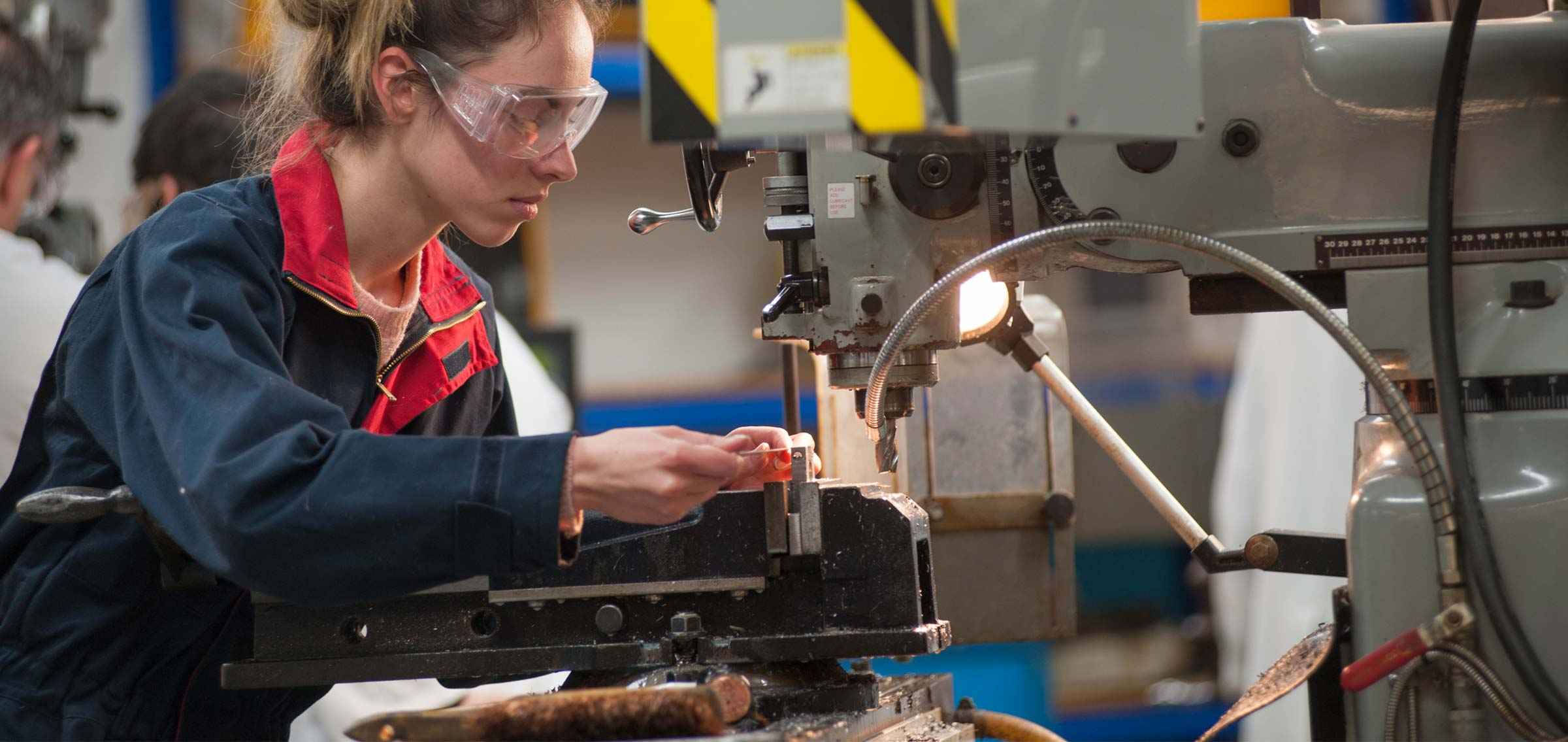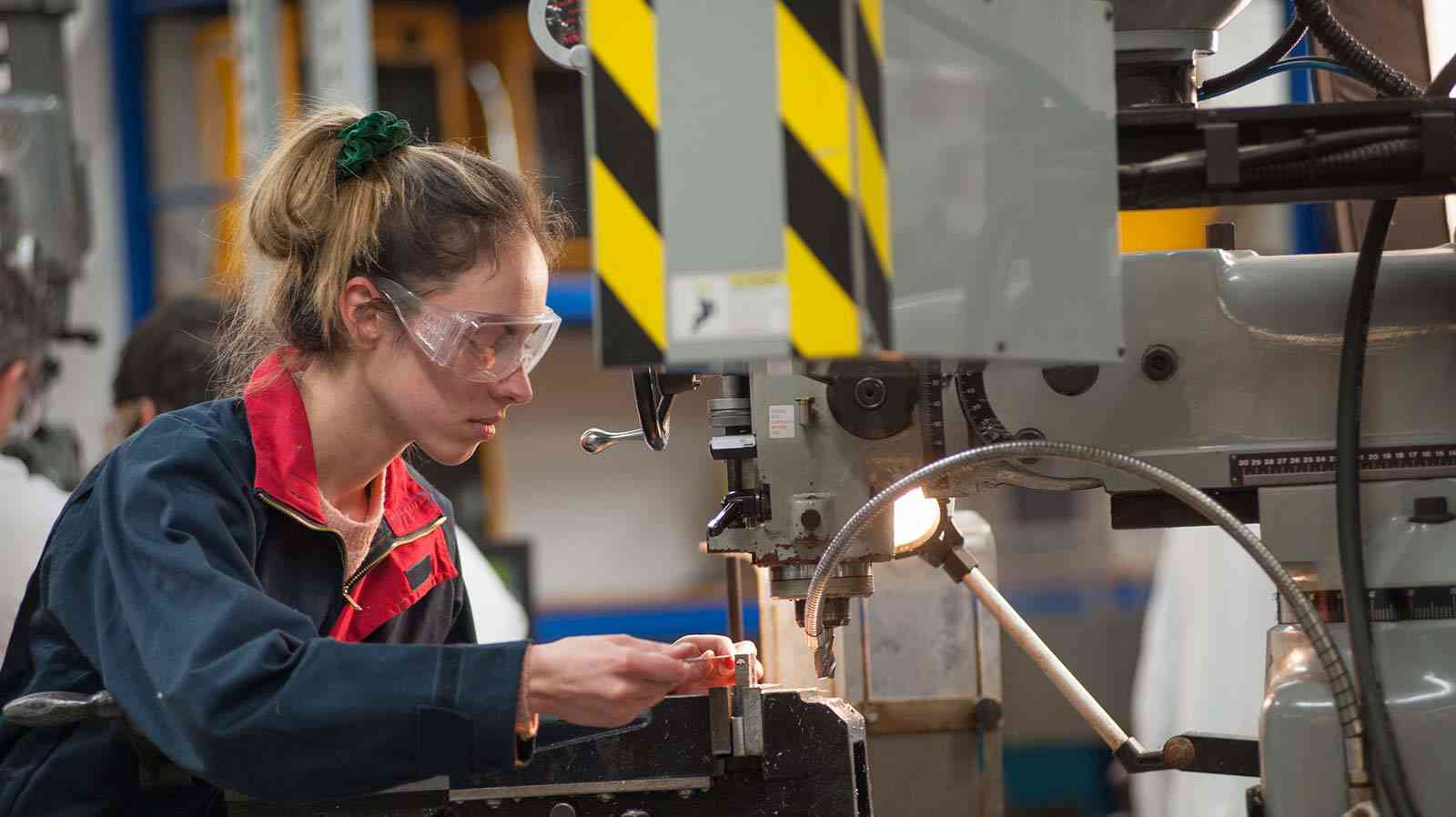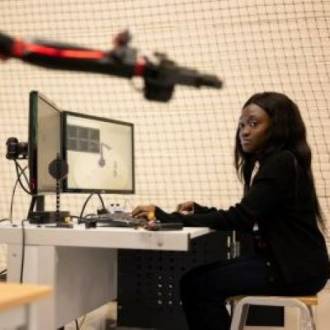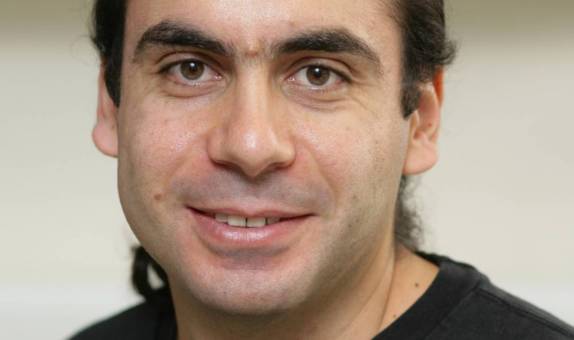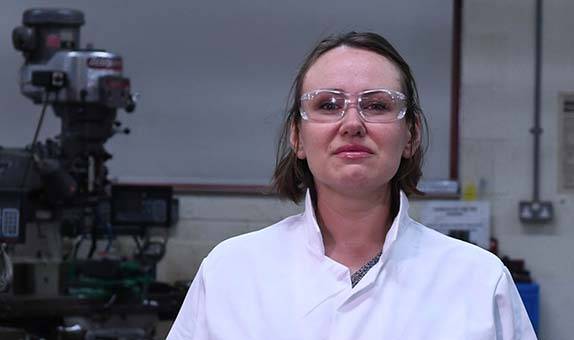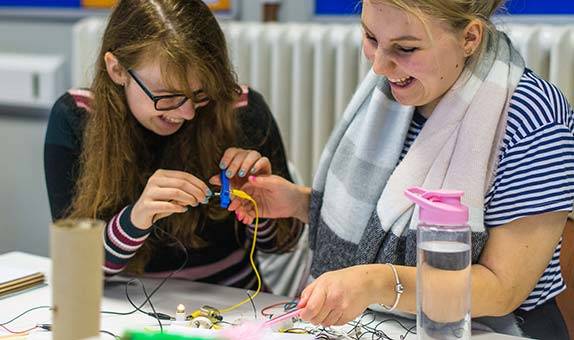Mechatronic Systems MSc
Why choose this course?
Mechatronics is an exciting, growing field that combines mechanical, electronic and control systems to create a complete device. It mostly relates to the mechanical systems that perform relatively fast and precise motions and therefore require sophisticated electronic devices and control algorithms. This hands-on course will help you develop the multidisciplinary knowledge that the fast-moving industrial, commercial and domestic sectors demand of their technical professionals.
The many applications of mechatronics include robotics, autonomous smart systems, hard-disk drives, tracking cameras, intelligent actuators in automotive systems, and intelligent prosthetics. You will be able to apply state-of-the-art control and machine learning techniques while working hands-on with robotics, autonomous unmanned platforms and facilities. You will take part in trips to the National Instruments' NIDays conference in London. With an individual project, you may research a subject of interest with the opportunity to publish your work.
The MSc will meet, in part, the exemplifying academic benchmark requirements for registration as a Chartered Engineer. Accredited MSc graduates who also have a BEng (Hons) accredited for CEng, will be able to show that they have satisfied the educational base for CEng registration.
| Mode | Duration | Attendance | Start date |
|---|---|---|---|
| Full time | 1 year | Delivered in one-week blocks | September 2024, January 2025 |
| Full time | 2 years including professional placement | Delivered in one-week blocks plus placement year | September 2024, January 2025 |
| Part time | 2 years | Delivered in one-week blocks | September 2024, January 2025 |
| Main location | Roehampton Vale |
Reasons to choose Kingston University
- This course is reviewed by experts from National Instruments, Thales, Atmel, Cadence, Texas Instruments, and the Institution of Engineering and Technology.
- This course meets, in part, the exemplifying academic benchmark requirements for registration as a chartered engineer. If you also have a BEng (Hons) accredited for Chartered Engineer (CEng), you will be able to show you have satisfied the educational base for CEng registration.
- You will use equipment from National Instruments, Quanser, Agilent Technology, Rethink Robotics
and different microcontrollers.
Accreditation
The MSc will meet, in part, the academic benchmark requirements for registration as a Chartered Engineer. Accredited MSc graduates who also have a BEng(Hons) accredited for CEng, will be able to show that they have satisfied the educational base for CEng registration.
It should be noted that graduates from an accredited MSc programme, who do not also have an appropriately-accredited honours degree, will not be regarded as having the exemplifying qualifications for professional registration as a chartered engineer with the Engineering Council; and will need to have their first qualification individually assessed through the individual case procedure if they wish to progress to CEng.
Find out more about Further Learning and discover all accredited degrees by visiting the Institution of Mechanical Engineers website.
Accreditation is a mark of assurance that the degree meets the standards set by the Engineering Council in the UK Standard for Professional Engineering Competence (UK-SPEC). Some employers recruit preferentially from accredited degrees, and an accredited degree is likely to be recognised by other countries that are signatories to international accords.
Please check the Engineering Council website for more information.
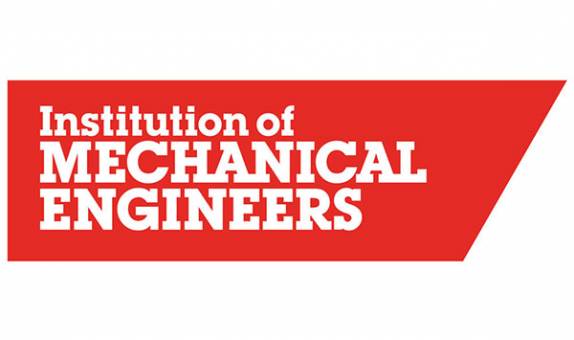
Institution of Mechanical Engineers
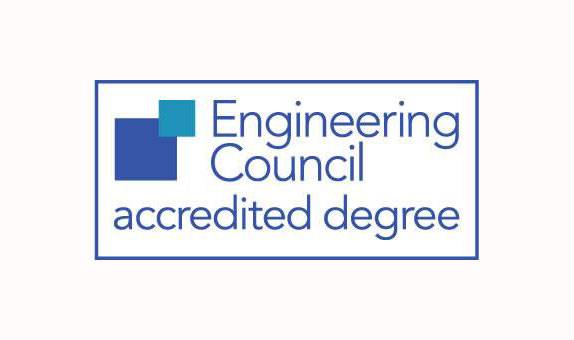
Engineering council
What you will study
Although mechatronics may be perceived in combination with robotics, as robots are indeed fast and precise mechanical systems, it also has wider applications. These include hard-disk drives for computers, tracking cameras for surveillance applications, intelligent actuators in automotive systems and many other areas, including devices used in the field of healthcare and rehabilitation, such as intelligent prosthetic devices.
The hands-on approach on the course, using our state-of-the art multidisciplinary laboratories with equipment from National Instruments, Freescale, Agilent Technology, Rethink Robotics and many more, adds value to this postgraduate degree. The course dovetails with research activities of the teaching staff, implementing the latest advances in our research. Using applied research, you will have the opportunity to do your own research within an individual industry-relevant 'capstone' project. This includes preparation of a scientific paper, giving an opportunity for that first breakthrough into publishing your work.
For a student to go on placement they are required to pass every module first time with no reassessments. It is the responsibility of individual students to find a suitable paid placement. Students will be supported by our dedicated placement team in securing this opportunity.
Modules
Professional placement
Core modules
Advanced Control Systems
15 credits
This module introduces you to classical control system analysis and design concepts. Time domain design methods are followed by frequency domain design methods. Although the module mainly deals with continuous-time systems, the discrete-time systems are also discussed. In addition to the fundamental concepts, the focus of this module is analytical and numerical problem solving, providing you with a set of skills that will enhance your employability. The module promotes creative problem-solving through an emphasis on analytical and numerical problem solving related to control systems. Digital competency is fostered by the use of simulation tools such as MATLAB & SIMULINK. Adaptability is nurtured as you navigate between time and frequency domain design methods and different types of control systems.
Industrial Robotics
15 credits
This module provides high level view on the design of mechatronic and automation systems. Applications and types of such systems are discussed. Main components of mechatronic design are introduced, including mechanical design through specialised software, sensors and actuators, control design, and software development for real-time implementation. Theoretical material is illustrated by practical laboratory sessions on real-time design, using industrial standard, state-of-the-art equipment. A range of transferable skills gained in this module is aimed to help with your work on your final project and extra-curricular activities available within the school.
Machine Learning
15 credits
The module introduces fundamental concepts and methods in Machine Learning and discusses their applications in smart mechatronic systems. You are firstly introduced to classical methods before they are taught modern state-of-the-art AI approaches. The module is taught in a practical fashion and therefore some knowledge of a programming language is required. This Machine Learning module, through its practical focus on smart mechatronic systems, empowers students with digital competency and creative problem-solving skills. Engaging with both classical and state-of-the-art AI approaches cultivates a questioning mindset and adaptability. The coursework encourages collaboration and resilience as you tackle complex real-world problems like autonomous driving. Regular feedback promotes self-awareness, and an enterprise mindset is fostered through real-world problem solving.
Design of Autonomous Systems
30 credits
The module introduces you to fundamental concepts and methods in autonomous systems and discusses their applications in smart mechatronic systems. You are exposed to applications related to autonomous systems. Furthermore, the module provides mathematical tools to analyse the dynamic behaviour of a mobile autonomous systems, e.g. a UAV. The module is taught in a project-based practical fashion and therefore some knowledge of a programming language is required.
Research Techniques, Innovation and Sustainability
30 credits
Research Techniques, Innovation and Sustainability equips you with the skills and knowledge required to select and justify a research topic and then to plan and execute that research project. Research is a broad topic covers a variety of activities that range from undertaking a project as part of an academic programme, through research and development in the commercial environment, to acquiring information to inform projects undertaken as part of routine business practice. This module introduces research in these contexts and allows you to develop your own research plan. As part of the module, you will consider setting research questions and determining hypotheses, acquire relevant information and data, apply suitable analytical techniques, and evaluate the significance and potential applications of their research findings. You will also develop your innovation skills through a combination of workshops and team working, resulting in submission of an innovation proposal aimed to address UN Sustainable Development Goal 11, Sustainable Cities and Communities.
The module covers many practical aspects surrounding research in the commercial environment including intellectual property and professionalism, and sustainability is embedded throughout the module both in course content and via development of the innovation proposal.
Dissertation
60 credits
Drawing on previous knowledge and experience, the dissertation module allows you to study an area of interest within your chosen field in significant depth. In undertaking the dissertation, you will develop not only a deeper understanding of your subject area but will also be able to demonstrate a high level of autonomy in terms of project dissertation planning and management. You will be able to demonstrate knowledge and competence in reviewing existing published literature and data and, through your own efforts, apply one or more of a range of research methods to collect and analyse data and draw well-founded conclusions as a result of your research. The main output from the module is a final report but the option is available for you to prepare their work in the format of an article suitable for submission to a relevant conference or journal.
Optional modules
Human Robot Interaction
15 credits
This module provides you with the knowledge of the basic principles of human-robot interaction (HRI), exploring the fundamentals of a new area of research related to robotics, focusing on the physical, cognitive, and social interaction between humans and robots. This module aims to provide you with a comprehensive understanding of HRI principles, theories, and practical applications. You will learn to design, evaluate, and implement effective HRI systems that enable seamless communication and collaboration between humans and robots.
Biologically Inspired Robotics
15 credits
This module explores the synergy between robotics and bio-inspired design, deriving design principles from living systems to enhance understanding in key areas such as mechatronic systems and sensor/actuator technologies. You will engage in a comprehensive learning journey encompassing lectures, tutorials and hands-on lab exercises. These formats will facilitate a deep understanding of the adaptability and autonomy present in animal life, and how these principles can be applied to robotics.
Professional placement
Professional Placement
120 credits
The Professional Placement module is a core module if you're following a masters programme that incorporates an extended professional placement. It provides you with the opportunity to apply your knowledge and skills in an appropriate working environment, and develops and enhances key employability and subject specific skills in your chosen discipline. You may wish to use the placement experience as a platform for a major project or your future career.
It is your responsibility to find and secure a suitable placement opportunity; this should not normally involve more than two placements which must be completed over a minimum period of 10 months and within a maximum of 12 months. The placement must be approved by your Course Leader prior to commencement to ensure its suitability. You will have access to the standard placement preparation activities offered by the Student Engagement and Enhancement (SEE) group.
Read more about the postgraduate work placement scheme.
Please note
Optional modules only run if there is enough demand. If we have an insufficient number of students interested in an optional module, that module will not be offered for this course.
Work placement scheme
Many postgraduate courses at Kingston University allow students to take the option of a 12-month work placement as part of their course. Although the University supports students in finding a placement and organises events to meet potential employers, the responsibility for finding the work placement is with the student; we cannot guarantee the placement, just the opportunity to undertake it. You may find securing a professional placement difficult as they are highly competitive and challenging, but they are also incredibly rewarding. It is very important to prepare and apply yourself if this is the route you wish to take. Employers look for great written and oral communication skills and an excellent CV/portfolio. As the work placement is an assessed part of the course, it is covered by a student's Student Route visa.
Find out more about the postgraduate work placement scheme.
Entry requirements
Teaching and assessment
What our students say
Formula Student competition
Join this course at Kingston and you too could join the KU e-Racing team and help it drive for success in Formula Student year after year. It's a great chance to apply theory to a real workplace project, enjoy the thrills of appearing at a major racing circuit and have something amazing to add to your CV.
About Formula Student
IMechE's Formula Student is the largest annual student motorsport event in the world. It is delivered in partnership with key industry players including Airbus, Jaguar Land Rover, Shell, National Instruments and Mercedes-AMG Petronas. Ross Brawn OBE (Team Principal, Mercedes AMG Petronas F1 team) is the patron and the event is entered by 141 university teams from 34 countries across the globe.
With its real-world bias, Formula Student is viewed by the motor industry as the standard for engineering graduates to meet. In fact, many high-profile motorsports engineers have participated in Formula Student whilst at university including Andrew Shovlin, chief race engineer of Mercedes-AMG Petronas F1 team and James Painter, engineering lead of vehicle integration working on the BLOODHOUND land speed record.
KU e-Racing shines at Silverstone
The week after the likes of Lewis Hamilton and Sebastian Vettel raced at the British Grand Prix, students from around the world competed in their own motorsport event at Silverstone in the Institution of Mechanical Engineers' Formula Student competition. Kingston University's KU e-Racing proved to be the only UK team with a viable electric vehicle - read about how the team got on.
You can also see the KU e-Racing car being assembled, the chassis being constructed and the car being transported to Silverstone, as well as glimpses of the business presentation made as part of the University's entry. Produced by students Karam Rajaby and Joseph Bannister (Television and Video Technology BSc (Hons)), Amy Nicole Tinker (Media Technology BSc (Hons)); and Luka Stokic (Automotive Engineering BSc (Hons)).
Watch out for their full-length documentary on Formula Student.
Kingston motorsport
Students on this course can also get involved with the successful Kingston University motorsport team.
Who teaches this course?
The course is taught by the Department of Mechanical Engineering. Staff have a wide range of experience across research and industry and continue to practise and research at the cutting edge of their discipline. This ensures that our courses are current and industry informed, ensuring you get the most relevant and up-to-date education possible.
The Department has strong links with industry leaders, including Delphi, Lotus Engineering, MAN and Thales. Many of our innovative, hands-on projects involve students as well as academics and receive national and global coverage.
Our applied approach to teaching is supported by dedicated laboratories for mechanical, automotive and motorsport engineering, including wind tunnels, state-of-the-art rapid prototyping and manufacturing machinery, a fully-equipped materials lab, engine test cells, an automotive diagnostics lab featuring the latest industrial software packages, and a modern electronics/robotics lab with the recent addition of a robot and electronic equipment from National Instruments.
Our courses encompass applications from all areas of engineering, providing our students with the knowledge and flexibility they need to work across many industries, both in the UK and overseas.
Postgraduate students may run or assist in lab sessions and may also contribute to the teaching of seminars under the supervision of the module leader.
Facilities
Our modern teaching environment
There is a wide range of facilities for practical work at our Roehampton Vale campus, where this course is based. You will have access to a modern environment with the latest technology and industry-standard equipment, including:
- rolling roads;
- automotive testing facilities;
- a Lotus Exige; and
- cars and motorcycles built by engineering students.
We also have a dedicated postgraduate workroom with high spec PCs and a range of software.
The £4 million Hawker Wing provides three floors of extra space for students and staff at Roehampton Vale, including improved learning and teaching facilities.
Fees for this course
Additional costs
Depending on the programme of study, there may be extra costs that are not covered by tuition fees which students will need to consider when planning their studies. Tuition fees cover the cost of your teaching, assessment and operating University facilities such as the library, access to shared IT equipment and other support services. Accommodation and living costs are not included in our fees.
Where a course has additional expenses, we make every effort to highlight them. These may include optional field trips, materials (e.g. art, design, engineering), security checks such as DBS, uniforms, specialist clothing or professional memberships.
After you graduate
The market for mechatronic systems is continually evolving. Graduates from this programme will be prepared for senior technical and management positions in a range of industries, including:
- automotive engineering
- avionics and aerospace
- defence
- robotics
- autonomous systems
- telecoms
- manufacturing.
Careers and recruitment advice
The Faculty has a specialist employability team. It provides friendly and high-quality careers and recruitment guidance, including advice and sessions on job-seeking skills such as CV preparation, application forms and interview techniques. Specific advice is also available for international students about the UK job market and employers' expectations and requirements.
The team runs employer events throughout the year, including job fairs, key speakers from industry and interviews on campus. These events give you the opportunity to hear from, and network with, employers in an informal setting.
How we work with industry partners
Our excellent industrial links have developed during many years and throughout many countries. Input from industry experts complements the teaching throughout the course.
We regularly review all our postgraduate courses to make sure that they are up-to-date, reflect industry needs and are comparable to other university courses. This programme is reviewed by an industrial panel, including National Instruments; Thales; Cadence; Texas Instruments; NXP; Atmel; and industrial bodies such as The IET, SEMTA and RAeS.
What this course offers you
- The Mechatronic Systems course is designed to give you an enhanced view of the subject.
- It will develop your professional, analytical and management skills, as well as improving your technical skills and knowledge. For example, you will gain communication, teamwork, IT and problem-solving skills.
- Each module combines a stimulating mix of lectures, practical laboratory work, group work, case studies and presentations.
- Input from industry experts complements the teaching throughout the course and we regularly review all our postgraduate courses to make sure that they are up-to-date, reflect industry needs and are comparable to other university courses. This programme is reviewed by an industrial panel, including National Instruments; Thales; Cadence; Texas Instruments; NXP; Atmel; and industrial bodies such as The IET, SEMTA and RAeS.
- You can choose to study the course full-time or part-time to fit in with work commitments. September and January start dates give you extra flexibility plus the programme is modular, with all modules delivered over one week. Professional placement is an option to get work making you more employable.
Current research in this subject
Engineering research at Kingston is organised into three established research centres and three emergent groups:
- Centre for Fire and Explosion Studies (CFES)
- Materials Research Centre (MATRC)
- Sustainable Technology Research Centre (STRC)
- Industrial Control Research Group (ICRG)
- Complex Flow Systems Research Group (CFSRS)
- The Aerospace Research Group (AERG)
These research centres/groups provide focus for our research activities and encourage the cross-fertilisation of ideas across different areas of the Faculty. For further details about ongoing research activities, visit the Faculty website.
Engineering research
Many academic staff are engaged in a range of research and consultancy activities funded by the Research Councils, the European Union, the government, trade unions and industry. These activities ensure our staff are in touch with the latest industry thinking and bring best practice to your studies.
Course changes and regulations
The information on this page reflects the currently intended course structure and module details. To improve your student experience and the quality of your degree, we may review and change the material information of this course. Course changes explained.
Programme Specifications for the course are published ahead of each academic year.
Regulations governing this course can be found on our website.
